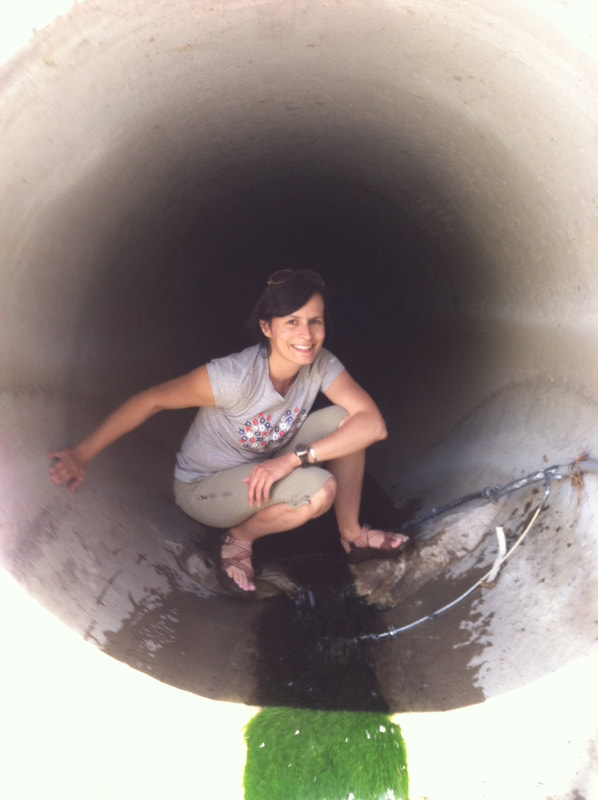To me, ecohydrology is field that allows us to examine how water presence and movement shapes ecosystem processes.
What are your undergraduate and graduate degrees in?
I have a B.S. in Biology from Grinnell College, an M.S. in Ecology from the University of Georgia, and a Ph.D. in Ecology and Evolution from Rutgers University.
How did you arrive at working in/thinking about ecohydrology?
I developed a fascination with dynamic aquatic systems during a year I spent abroad in India as an undergraduate. During this time I conducted research in the Ganges River ecosystem, which is constantly in a different state of flooding, depending on season. The city in which I lived (Varanasi) had been constructed to be two different types of human habitat, depending on whether the river was running high (monsoon season) or low (dry season). Both the river and the city became completely different environments during these different seasons, which was so exciting and interesting! The people living in Varanasi also have a very complex relationship with the river, both relying on and revering it, while also releasing raw sewage and trash into it (not too different from our waterways in NYC, where I currently work!). Living in and studying this system, I developed an interest in how the movement and presence of water shapes ecosystems, especially urban ecosystems, and the behavior of organisms (including humans) within those ecosystems. I went on to study the impact of hydroelectric dams on floodplain hydrology and ecosystem productivity for my Master’s degree, and then moved into urban stormwater research, where I continue to examine how urban runoff shapes and regulates ecological processes (especially nutrient cycling) and ecosystem services (especially nutrient removal) in wetlands and streams.
What do you see as an important emerging area of ecohydrology?
A field in my mind that is gaining increasing importance is that of urban ecohydrology, specifically the types of hydrologic characteristics and novel aquatic or wetland ecosystems that develop from human activities and infrastructure in cities. We still know very little about the net human benefits (i.e., ecosystem services) and harms (i.e., ecosystem disservices) conveyed by water movement and presence in cities, and the environmental outcomes and tradeoffs that emerge from urban runoff management and infrastructure. With increased movement of global human populations into cities and concurrent land use and global climate change, we need to understand more about how rising sea levels, urban runoff, and human infrastructure influence ecosystem processes (carbon storage, community dynamics, nutrient cycling, energy cycling) that are important to human and environmental wellbeing. In this vein, I have been examining the characteristics of, and ecosystem services and disservices provided by, many different types of wetlands receiving urban runoff and wastewater, including an interesting type of novel ecosystem that I have dubbed “accidental urban wetlands”. These wetland ecosystems were not constructed or designed by humans, but emerged on their own from urban runoff pooling in low-lying parts of the urban landscape.
Do you have a favorite ecohydrology paper? Describe/explain.
One of the most formative papers in my career is Junk et al. (1989): “The Flood Pulse Concept in River-Floodplain Systems,” which introduced the concept that floodplain ecosystems are aquatic/terrestrial transition zones that must have dynamic hydrology in order to persist. This paper was one of the first to postulate the exciting idea that there are ecosystems that were neither purely aquatic, nor purely terrestrial, but both at the same time. It was also groundbreaking in that it presented floods as the most important variable shaping river ecosystems, rather than as catastrophic events that destroy ecosystems. This paper was responsible for shaping my entire career trajectory – when I read it, I was captivated by the idea that there were ecosystems that were shaped by hydrologic processes that were ever-changing, and defied traditional binary (aquatic/terrestrial) definitions of ecological system types.
What do you do for fun (apart from ecohydrology)?
I enjoy reading all kinds of fiction and nonfiction books, watching really bad reality television, traveling to new places, and spending a lot of time outdoors (hiking, camping, beach time, surfing). I have also recently been devoting time to improving my foreign language skills.

 RSS Feed
RSS Feed